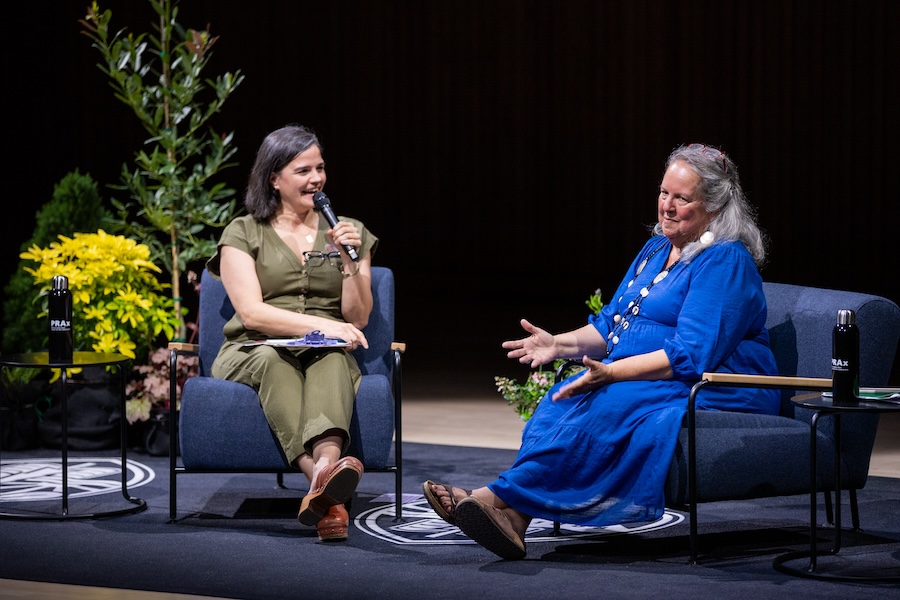The CLA websites are currently under construction and may not reflect the most current information until the Fall Term.

Photo of MFA Director, Elena Passarello in conversation with Robin Wall Kimmerer, captured by Blake Brown
Watch the full lecture here
By Sam Olson
Friday, May 17th was nonstop for Dr. Robin Wall Kimmerer. On the afternoon before receiving the Stone Award for Literary Achievement, the scientist and author of Gathering Moss and Braiding Sweetgrass got herself prepared by meeting a cohort of Oregon State MFA students for a quiet plant-focused walk around campus. "Pay attention to what grabs your attention," she said. "Let it speak to you. And think, why is it calling out to me?"
When a few graduate writing students started pulling cattail fluff off the stalks to play with, the Potawatomi botanist didn't rush over to stop them. Instead, she took some fluff in her hand and shared how in certain cultural traditions, the cattail is called "the carpet plant." "It's perfect for lining floors, blankets, and even diapers," she said. "What would you want to call it, though?"
Kimmerer's affirmation of the students' curiosity reflected the generosity of her spirit. Prior to meeting the MFA students, she'd spent two hours answering questions on "Think Out Loud," an OPB show that was recorded live at PRAx. Before that, she had driven four hours to Corvallis from Bend, where she had given a talk the night before. That she had anything left in the proverbial "tank" felt like pure magic, and she hadn't even given her lecture yet.
As a Stone Award recipient, Kimmerer was honored as "a major American author who has created a body of critically acclaimed literary work and has been—in the tradition of creative writing at OSU—a dedicated mentor to succeeding generations of young writers." During her visit, the science writer's commitment to younger writers was on full display; after the plant walk, Kimmerer sat in a circle with the MFA students to discuss what had been "calling out" to them, and how to "be in conversation with those more-than-human beings." It was a discussion that honed naturally into themes of reciprocity and listening, which Kimmerer aptly modeled.
The writer's reach in the Corvallis community went beyond her time at Oregon State. In anticipation of her award, student participants at Crescent Valley High School, Corvallis High School, and the public library joined separate Braiding Sweetgrass book-clubs that
read and discussed the book through lenses of kinship and decolonization. Those students were invited to write and share questions with Kimmerer during her radio show recording and at the Stone Award Lecture.
Students of all disciplines at OSU also participated in a one credit book club that met weekly to discuss various themes in the book. Pods of 10 students worked together to lead discussions for the whole group, whose registration cap had to be raised to accommodate the demand. Students also enjoyed a moss walk and looked at mosses under microscopes, braiding together various ways of studying and interpreting the more-than-human world.
To cap off the night, Dr. Robin Wall Kimmerer presented a lecture and received the Stone Award in front of a packed audience in the PRAx theater, an event that had been sold out for months. Exploring the potential roles of Nature Writers in a world in crisis, Kimmerer emphasized themes of kinship, reciprocity, and respecting the agency of more-than-human beings; in her words, one of the most pressing roles of a Nature Writer is to find and practice the "grammar of animacy."
The Native Student Association honored her with a blanket designed to represent and honor the nine recognized tribes of Oregon, as well as those Indigenous peoples forcibly removed to nearby states. With the tribal blanket draped over her shoulders, Kimmerer bowed and thanked the audience, an embodiment of gratitude and togetherness.
Just a week after Corvallis was graced with a rare sighting of the aurora borealis, Dr. Kimmerer's visit brought a continuation of awe and newfound wonder. After the evening lecture, MFA students could be seen greeting, as if for the first time, Oregon State's plethora of stately maples, oaks, and rhododendrons. What the writer offered, in a sliver of time, was an invitation to be in "kinship" with those beings around us, both human and more-than-human; it was a welcoming to be "at home."